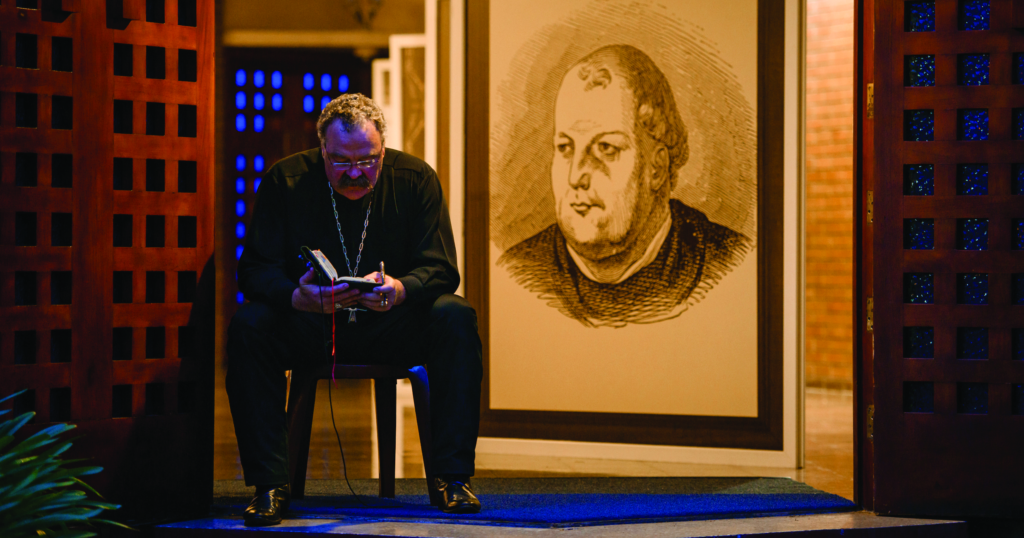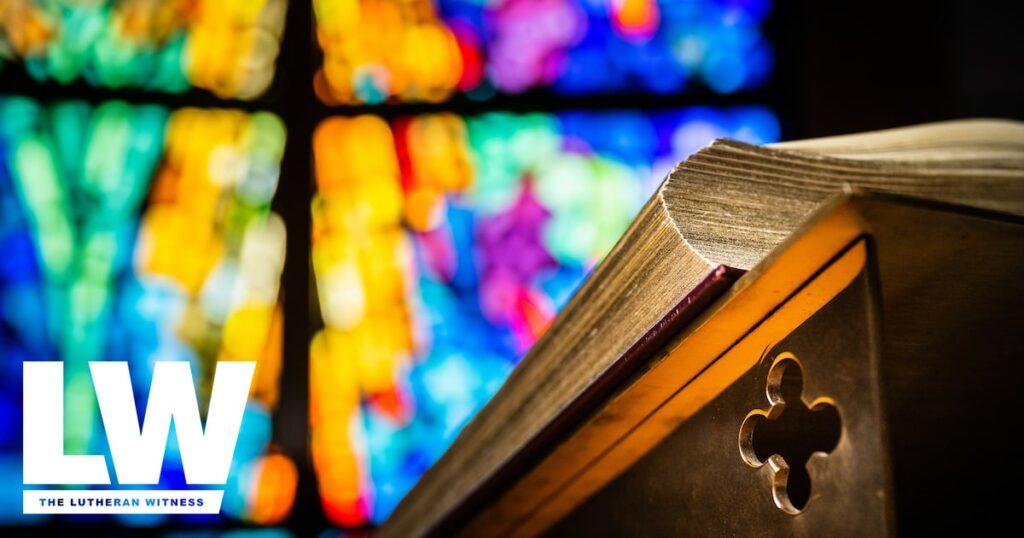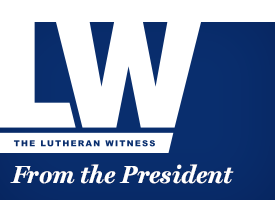by Matthew C. Harrison
The Scriptures are God’s own verbally inspired words. When God’s Word encounters us — either preached or printed — it is received in faith (by God’s doing) or rejected (by man’s doing; cf. Acts 13:46–48). An encounter with Christ demands a confession. “‘But who do you say that I am?’ Simon Peter replied, ‘You are the Christ, the Son of the living God’” (Matt. 16:15–16).
The Word of God is our supreme authority in all matters of faith and life. In response to that Word, the Church has at various times and places produced confessions of what that means. In this important section of our Lutheran Book of Concord as quoted below[1] (to which all churches, schools, pastors, teachers and commissioned ministers swear), the Lutheran church confesses this important distinction regarding the Bible as the “sole source and norm of doctrine,” yet faithfully confessed.
Summary Content, Rule, and Norm
We believe, teach, and confess that the only rule and norm according to which all teachings, together with ‹all› teachers, should be evaluated and judged [2 Timothy 3:15–17] are the prophetic and apostolic Scriptures of the Old and New Testament alone. For it is written in Psalm 119:105, “Your word is a lamp to my feet and a light to my path.” St. Paul has written, “even if we or an angel from heaven should preach to you a gospel contrary to the one we preached to you, let him be accursed” (Galatians 1:8).
However, other writings by ancient or modern teachers — no matter whose name they bear — must not be regarded as equal to the Holy Scriptures. All of them are subject to the Scriptures [1 Corinthians 14:32]. Other writings should not be received in any other way or as anything more than witnesses that show how this ‹pure› doctrine of the prophets and apostles was preserved after the time of the apostles, and at what places.
Right after the time of the apostles, and even while they were still living, false teachers and heretics arose [Titus 3:9–10]. Therefore, symbols (i.e., brief, concise confessions) were written against the heretics in the Early Church. These symbols were regarded as the unanimous, universal Christian faith and confession of the orthodox and true Church. They are the Apostles’ Creed, the Nicene Creed, and the Athanasian Creed. We pledge ourselves to these symbols, and in this way we reject all heresies and teachings that have been introduced into God’s Church against them.
However, schisms in matters of faith have also happened in our time. Therefore, we regard as the unanimous consensus and declaration of our Christian faith and confession — especially against the papacy and its false worship, idolatry, superstition, and against other sects — the first, unaltered Augsburg Confession. It is the symbol of our time, and it was delivered to the Emperor, Charles V, at Augsburg in the year 1530 in the great Diet. We hold to this confession along with its Apology and the Articles composed at Smalcald in the year 1537, which the chief theologians signed at that time.
Such matters also concern the laity and the salvation of their souls. Therefore, we also confess Dr. Luther’s Small and Large Catechisms as they are included in Luther’s works. They are “the layman’s Bible” because everything necessary for a Christian to know for salvation is included in them, which is handled more extensively in the Holy Scriptures.
As announced above, all teachings are to be conformed in this way. What is contrary to these confessions is to be rejected and condemned, as opposed to the unanimous declaration of our faith.
In this way the distinction between the Holy Scriptures of the Old and of the New Testament and all other writings is preserved. The Holy Scriptures alone remain the judge, rule, and norm. According to them — as the only touchstone — all teachings shall and must be discerned and judged to see whether they are good or evil [1 Thessalonians 5:21–22], right or wrong.
The other symbols and writings mentioned above are not judges like the Holy Scriptures. They are only a testimony and declaration of the faith. They show how the Holy Scriptures have been understood and explained in regard to controversial articles in God’s Church by those living at that time. Also, they show how the opposite teaching was rejected and condemned ‹by what arguments the dogmas conflicting with the Holy Scriptures were rejected and condemned›.[2]
[1] Paul T. McCain et al., eds., Concordia: The Lutheran Confessions, 2nd ed. (St. Louis: Concordia, 2005).
[2] From Concordia: The Lutheran Confessions © 2005, 2006, Concordia Publishing House. Used with permission.
–Pastor Harrison






Dr. Luther’s Small and Large Catechisms are “the layman’s Bible” BECAUSE EVERYTHING NECESSARY FOR A CHRISTIAN TO KNOW FOR SALVATION IS INCLUDED IN THEM, WHICH IS HANDLED MORE EXTENSIVELY IN THE HOLY SCRIPTURES.
Without the sound doctrine of the catechisms, laypeople, self proclaimed “spiritual” people, and various cult figures have manufactured all manner of horrendously false doctrines. I’m thankful for our Small & Large Catechisms.
We laypeople are not theologians. I’m certain it is very easy and not at all laborious to say ridiculous “spiritual” sounding things. Many people do and then go author books about their grand delusions. Before long, the laypeople can’t wait to do a “Bible” study using the latest Enthusiastic novel or semi-pelagian best seller. The Word gets muddled and the pastors have to work overtime to get the sheep through the narrow gate.
Matthew 7:13-14 comes to mind.
“Enter by the narrow gate. For the gate is wide and the way is easy that leads to destruction, and those who enter by it are many. For the gate is narrow and the way is hard that leads to life, and those who find it are few.
The catechisms make for visible, solid gate posts.
Carol,
Thank you for your encouragements. I would certainly agree with you in everything you have said, though I would add one little caveat: Laypeople are theologians. No, you perhaps have not attended seminary, but you have listened to the Word of God being proclaimed in church, you have studied the Word of God with your pastor, you have learned from the catechism. You, no doubt, have thoughts and ideas about who God is and what He has done for you. And, you doubtless share this faith with others. This makes you a theologian in some way. do not downplay that. There’s a great story in Bo Giertz’s book, Hammer of God, about a woman who gently teaches the practical matters of theology to the young, inexperienced pastor in a wonderful way. I highly recommend the book.
That said, the rest of your comment is spot on. The catechism is a summary of what is necessary for salvation, and these guideposts help prevent us from going off on our grand delusions. They are the layman’s Bible because they teach the Scripture. Well said.
Thank you Pastor Askins. Hammer of God has just downloaded to my kindle.
“Dr. Luther’s Small and Large Catechisms … are ‘the layman’s Bible’…” ?
I myself am a Lutheran layman, and my Bible is The Bible.
Thank you, Pastor Harrison, for keeping God’s Word first and foremost .